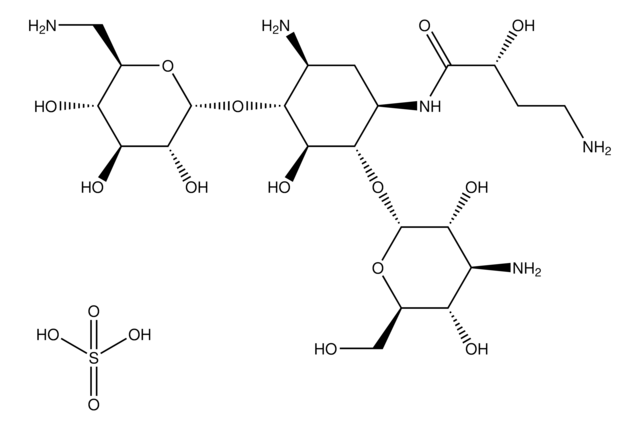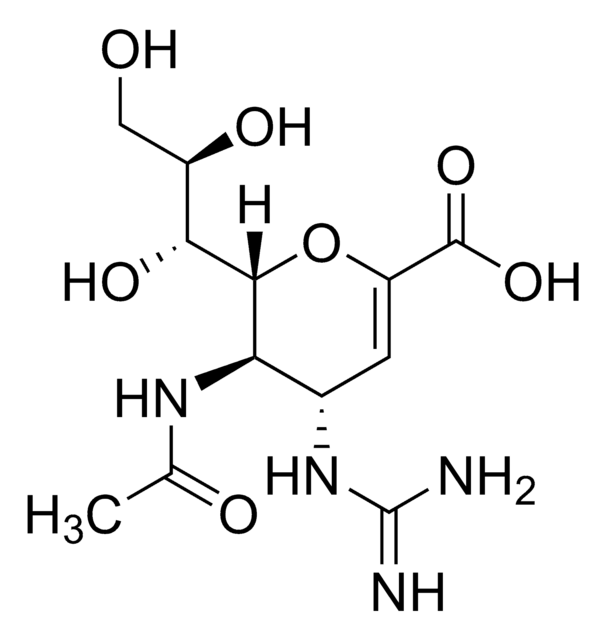T4014
Tobramycin
Aminoglycoside antibiotic
Synonym(s):
3′-Deoxykanamycin B, Nebramycin Factor 6, O-[3-Amino-3-deoxy-α-D-glucopyranosyl-(1→6)]-O-[2,6-diamino-2,3,6-trideoxy-α-D-ribohexopyranosyl-(1→4)]-2-deoxy-D-streptamine
About This Item
Recommended Products
biological source
Streptomyces tenebrarius
Quality Level
form
powder
storage condition
(Keep container tightly closed in a dry and well-ventilated place. Keep in a dry place.)
concentration
≥900 μg/mg (anhydrous)
color
white to off-white
antibiotic activity spectrum
Gram-negative bacteria
Mode of action
protein synthesis | interferes
storage temp.
2-8°C
SMILES string
NC[C@H]1O[C@H](O[C@@H]2[C@@H](N)C[C@@H](N)[C@H](O[C@H]3O[C@H](CO)[C@@H](O)[C@@H](N)[C@H]3O)[C@H]2O)[C@H](N)C[C@@H]1O
InChI
1S/C18H37N5O9/c19-3-9-8(25)2-7(22)17(29-9)31-15-5(20)1-6(21)16(14(15)28)32-18-13(27)11(23)12(26)10(4-24)30-18/h5-18,24-28H,1-4,19-23H2/t5-,6+,7+,8-,9+,10+,11+,12+,13+,14-,15+,16-,17+,18+/m0/s1
InChI key
NLVFBUXFDBBNBW-SNGYORCQSA-N
Looking for similar products? Visit Product Comparison Guide
General description
Application
- to study the effect of tobramycin on bacteriophage infected biofilms
- to study the effects of antibiotics on Pseudomonas aeruginosa strain
- as a comparator antibiotic
Biochem/physiol Actions
Tobramycin is used to treat Pseudomonas aeruginosa lung infections and is used in combination with other antibiotics to treat urinary tract infections, gynecologic infections, peritonitis, endocarditis, pneumonia, sepsis, respiratory infections, osteomyelitis, and other soft-tissue infections. It is a potential therapy for sinus infections.
Mode of Action: Binds to 70S ribosomal subunit; inhibits translocation; elicits miscoding.
Spectrum of Activity: Gram negative bacteria. Not effective against Enterococci.
Other Notes
Signal Word
Warning
Hazard Statements
Precautionary Statements
Hazard Classifications
Repr. 2
Storage Class Code
11 - Combustible Solids
WGK
WGK 3
Certificates of Analysis (COA)
Search for Certificates of Analysis (COA) by entering the products Lot/Batch Number. Lot and Batch Numbers can be found on a product’s label following the words ‘Lot’ or ‘Batch’.
Already Own This Product?
Find documentation for the products that you have recently purchased in the Document Library.
Customers Also Viewed
Our team of scientists has experience in all areas of research including Life Science, Material Science, Chemical Synthesis, Chromatography, Analytical and many others.
Contact Technical Service











